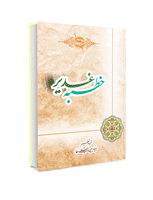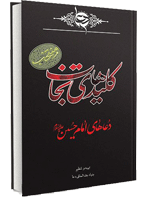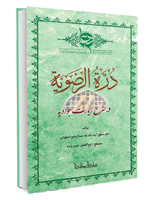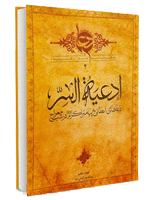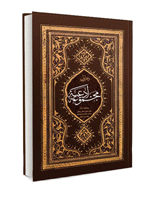- Prophet Muhammad (P.B.U.H&HF): Whenever one of you is needy and brings that to other people, he will not be satisfied. and Whenever someone is needy and brings that to Lord, he shall give him what he wants. sooner or later.
- Imam Sadiq (As.): Whenever you had tenderness in your heart, Pray. because your heart doesn't get tender unless it's pure.
- I told to Imam Baqir (A.S): “What is the meaning of “truly, Ibrahim was awwah and patient”? He replied: “Awwah means (the one who is) praying (to) and wailing (for God) a lot.””
- “Two people, who have acted alike, enter the heaven, but one of them sees the other one in a higher place. Then, he says: O’ Lord! How come has he a superior place in comparison to me while we acted alike? God the Almighty replies: “because he asked Me (whatever he needed) and you did not do that”.
- “The most knowledgeable person to God is the one who asks more from Him”
- “Whoever prays a lot, the angels say: This voice is familiar (to us) and this is the supplication which is accepted and this is the need which is provided”
-
The Holy Prophet (peace be upon him and his Household):
-
وَ لَوْ عَرَفْتُمُ اللَّهَ حَقَّ مَعْرِفَتِهِ لَزَالَتِ الْجِبَالُ بِدُعَائِكُم
If you knew god the way you should’ve known, Mountains definitely will be moved by your supplications. - Crying out of fear of God is the key to his mercy, it’s a sign for his acceptance and it’s a door to answering [supplications]
- Pray to God and believe in his answeres. But understand that God won't accept prays from an unwitting oblivious heart.
The Constituents of Supplication
The Constituents of Supplication
Sayyid Zafar Hasan Amrohi
One of the important issues included in the holy verse regarding supplication and Almighty God's promise to respond (2:186) is that it has mentioned some constituents for supplication:
The first constituent is the the attraction between the supplicant and Allah.
The second constituent is the supplicant who should have certain conditions for his supplication to be responded to. The supplicant should be sincere in his intention. This
is because, as it has been mentioned earlier, the mouth's tongue should express the heart's tongue. Therefore a wandering heart (Lahi) and an ignorant heart (Sahi) can not be a supplicant (da'ee).
The third constituent is Allah (or Mad'uo—the invoked one). This means that the supplicant should recognize his God and should know that Allah is unique.
Now we will deal, in more details, with each one of these constituents so that we can use supplication with more insight and benefit from this treasure, which is of great significance to God's servants.
The fourth condition for a supplicant is to be sincere. It means that he should call only God and no one else.
فَادْعُوا اللَّهَ مُخْلِصِینَ لَهُ الدِّینَ.
“Therefore call upon Allah, being sincere to Him in obedience. 40:14”
A servant of God should not assume that anybody else could help him except God. His heart should be ready to invoke the One and Only God about his needs and tell Him his untold and hidden secrets and disconnect himself from any means other than God. If he sees that the superficial means is effective, he should realize that the effecter and influencer is God. In the holy Qur'an we read:
أَمَّنْ یُجِیبُ الْمُضطَرَّ إِذَا دَعَاهُ وَیَکْشِفُ السُّوءَ.
“Or, Who answers the distressed one when he calls upon Him and removes the evil. 27:62”
Yes, a non-afflicted and non-depressed person does not know who the real manager of the affairs is. But an afflicted and depressed person knows that the initiation and the end of everything is God
alone. A real monotheist considers the others as a means to get to one's goals and knows that God has appointed them as an intermediary only. Imam as-Sajjad (s) invokes God by saying:
وَاجْعَلْنی مِمَّنْ یَدعُوكُ مخلِصاً فی الرّخاءِ دُعاءَ المُخْلِصینَ المُضْطَرّینَ لكَ فی الدُّعاءِ.
“O my Lord, make me among those, who, when at ease, invoke You like the supplication of the distressed sincere ones.”
He also says:
اَللّهُمّ إنّی أخْلَصْتُ بإنقِطاعِی إلَیْكَ وَأقْبَلْتُ بِكُلِّی عَلَیكَ وَصَرَفْتُ وَجْهی عَمَّنْ یَحْتاجُ إلی رِفْدِكَ وَقَلَبْتُ مَسْألَتی عَمَّنْ لَمْ یَسْتَغْنِ عَنْ فَضْلِكَ وَرَأیْتُ أنَّ طَلَبَ المُحْتاجِ إلی المُحْتاجِ سَفَهٌ مِنْ رَأیِهِ وَضِلَّهٌ مِنْ عَقْلِهِ.
“O Allah, I have become sincere by devoting myself to You, come to You with all my soul, turned away from anyone, who needs Your support and have refrained from asking anyone, who is in need to Your favor. I have found that it is foolishness and insanity when a needy one asks another needy one for support.”
He has, as well, allocated the preface of one of his most beautiful and longest supplications to sincerity, in which he sees that the source of every good and salvage is God. Every evil-doer or good-wisher is in the domain of Allah. He adds:
مِنْ أیْنَ لِیَ الخَیْرُ یا رَبِّ وَلا یوجَدُ إلاّ مِنْ عِنْدِكَ؟ وَمِنْ أیْنَ لیَ النَّجاهُ وَلا تُسْتَطاعُ إلاّ بِكَ؟ لا الَّذِی أحْسَنَ اسْتَغْنی عَنْ عَونِكَ وَرَحْمَتِكَ وَلا الّذی أساءَ وَاجْتَرأَ عَلَیْكَ وَلَمْ یُرْضِكَ خَرجَ عَنْ قُدْرَتِكَ یا رَبِّ.
“O my Lord, where from can I get goodness whereas it is not got
except from You, how can I get deliverance whereas it is not possible except by You? Neither he, who has done good, does that without Your support and mercy, nor does he, who has done wrong, opposed You and has not believed in You, get out of Your power”.
The Prophet (s) says:
فَاسْأَلوا اللهَ رَبَّکم بِنِیّاتٍ صادِقَهٍ وَقُلوبٍ طاهِرَهٍ.
“Invoke Allah, your god, with sincere intents and pure hearts.”
Imam as-Sadiq (s) says:
القَلْبُ السّلیمُ الّذی یَلقی رَبَّهُ وَلَیسَ فیهِ أحَدٌ سِواهُ.
“The true heart is the one, which has no one in it except Allah.”
تَبَحَّروا قُلوبَكُم فإنْ أنْقاها اللهُ مِنْ حَرَكَهِ الواجِسِ لِسَخطِ شَیءٍ مِن صُنْعِه فإذا وَجَدْتُمُوها كَذلِكَ فَاسْئَلوهُ ما شِئْتُم.”
“Check your hearts; if you find them free from fear and suspicion about what Allah has willed, then ask Allah for whatever you like.”
The fifth condition for a supplicant is that his invoking must be real and genuine. This means that when he asks for something and gets it, he should not show repugnance. Such a person in fact has asked for something which he does not need. Thus he has not really involved himself in supplication. This is because that the act of supplication entails lots of responsibilities which this individual has been negligent of. He may even use his tongue without intending what he says. This means that his mouth's tongue might not be in harmony with his heart's tongue. Imam Ali (s) says:
اَللّهُمّ اغْفِرْ لی ما تَقَرَّبْتُ بهِ إلَیكَ بِلِسانی ثُمّ خالَفَهُ قَلبی.
“O Allah, forgive me for what I have
approached to You with my tongue and then my heart has opposed it.”
When Abraham (s) was arguing with the infidels and was praising his God, he said: My God is one, who:
الَّذِی خَلَقَنِی فَهُوَ یَهْدِینِی. وَالَّذِی هُوَ یُطْعِمُنِی وَیَسْقِینِی. وَإِذَا مَرِضْتُ فَهُوَ یَشْفِینِی. وَالَّذِی یُمِیتُنِی ثُمَّ یُحْیِینِ. وَالَّذِی أَطْمَعُ أَنْ یَغْفِرَ لِی خَطِیئَتِی یَوْمَ الدِّینِ.
“Who created me, then He had shown me the way. And He who gives me to eat and gives me to drink. And when I am sick, then He restores me to health; and He who will cause me to die, then gives me life; and who, I hope, will forgive me my mistakes on the Day of Judgment. 26:78-82”
He has ascribed to God the power of guidance and the acceptance of guidance to himself. He has ascribed feeding to God and hunger and thirst to himself. He ascribed healing to God, but disease to himself. He recognizes life and death to be Allah's. He knows that to err is a matter of man but to forgive is Allah's. Then he invoked Allah by saying:
رَبِّ هَبْ لِی حُکْمًا وَأَلْحِقْنِی بِالصَّالِحِینَ. وَاجْعَلْ لِی لِسَانَ صِدْقٍ فِی الْآخِرِینَ. وَاجْعَلْنِی مِنْ وَرَثَهِ جَنَّهِ النَّعِیمِ. وَاغْفِرْ لِأَبِی إِنَّهُ كَانَ مِنْ الضَّالِّینَ.
“My Lord, grant me wisdom, and join me with the good; and ordain for me a goodly mention among posterity; and make me of the heirs of the garden of bliss. And forgive my father, for surely he is of those who have gone astray; and disgrace me not on
the day when they are raised. 26:83-86”
Abraham (s), through these words has asked God for all means of perfection. He considers himself as devoid of any sort of perfection and he has ascribed to God all good epithets.
First Constituent: The Spiritual Attraction
One of the most significant assets God has bestowed upon His servants is the spiritual attraction which is emphasized in numerous traditions:
مَنْ أعْطَی الدُّعاءَ أَعْطی الإجَابَهَ.
“The one who has given you supplication will respond to it.”
Both Sunni and Shia sources report from the Prophet (s) his saying:
الدُّعاءُ سِلاحُ المُؤمِنِ.
“Supplication is the believer's weapon.”
In Bihar al-Anwar, we read the following tradition:
لا یَرُدُّ القَضاءَ إلاّ البَلاءُ.
“Nothing causes a divine decree to be annulled except supplication.”
Imam as-Sadiq (s) has said:
الدُّعاءُ یَرُدُّ القَضاءَ بَعْدَ ما أُبْرِمَ إبْراماً، فَأَکْثِرْ مِنَ الدُّعاءِ فإنَّهُ مِفتاحُ كُلِّ رَحْمَهٍ وَنَجاحُ كُلِّ حاجَهٍ وَلا یُنالُ ما عِنْدَ اللهِ عَزَّ وَجَلَّ إلاّ بالدُّعاءِ وَلَیْسَ بابٌ یَکْثُرُ قَرْعُهُ إلاّ یوشَكُ أنْ یُفتَحَ لِصاحِبِهِ.
“Supplication causes a divine decree to be annulled after it has been confirmed. Practice supplication too much for it is the key to every mercy and the means for every need to be satisfied. Nothing of the blessings of Allah will be gained save by supplication. Every door that is knocked repeatedly will be opened.”
We read in Imam Ali's will to Imam Hassan (s) mentioned in Nahj al-Balaghah:
ثُمَّ جَعَلَ فی یَدِكَ مَفاتِیحَ خَزائِنِهِ بِما أَذِنَ لَكَ فِیهِ مِنْ مَسأَلَتِهِ، فَمَتی شِئْتَ اسْتَفْتَحْتَ بِالدُّعاءِ أبْوابَ نِعَمِهِ وَاسْتَمْطَرْتَ شَآبیبَ رَحْمَتِهِ.
“Then Allah put into your hands the keys of His treasures when He allowed you to
ask Him for what you like. So whenever you like, you can open with supplication the doors of His blessings and ladle from His mercy.”
Imam as-Sajjad (s) says:
الحَمْدُ للهِ الّذی أُنادِیهِ كُلَّما شِئْتُ لِحاجَتی وَأَخْلو بهِ حَیثُ شِئْتُ لِسِرّی بِغَیْرِ شَفیعٍ، فَیَقْضِی لی حَاجَتی.
“Praise be to Allah, Whom I call whenever I like and become alone with Him without an intercessor so that He achieves my need.”
Thus, supplication is a huge abundance and blessing which Allah, the Beneficent, has given to His servants. It is a treasure exposed to them. Thus anybody, who is lucky enough to gain it, will have an immense asset. Despite the fact that it may be answered or not, supplication is a great virtue by itself.
In the Sabah (morning) Supplication, we read:
إلٰهِی إنْ لَمْ تَبْتَدِئْنی الرّحْمَهَ مِنْكَ بِحُسْنِ التّوْفِیقِ فَمَن السّالِكُ بی إلَیْكَ فی وَاضِحِ الطّریقِ.
“O My God, if you do not bestow upon me Your mercy by making me succeed in turning towards You, then who is going to guide me to You in the clear way?”
Imam Husayn (s) says in Arafah Supplication:
إلٰهِی أطْلُبْنی بِرَحْمَتِكَ حَتیّ أصِلَ إلَیكَ وَاجذِبْنی بِمَنِّكَ حَتیّ أُقْبِلَ عَلَیكَ.
“O my God, invite me with Your mercy to join You and attract me with Your favor so that I approach to You!”
It happens that a man, in difficult times of depression, does everything and resorts to any means but he forgets supplication, despite the fact that the only way of salvage is supplication. After suffering a lot of hardships and realizing
that nobody could help him, one resorts to supplication. Of course, this is reckoned as a success, but the real success is obtained when we resort to supplication at the initial stages of coming across with impassable hurdles so that God may open up His doors of blessings and abundance before we get despair. Shaykh al-Koleyni, concerning this issue, reports from Imam as-Sadiq (s):
هَلْ تَعْرفونَ طُولَ البَلاءِ مِنْ قِصَرِهِ؟ قلنا: لا، قال: إذا أُلْهِمَ أَحَدُكُم الدُّعاءَ عِندَ البَلاءِ فَاعْلَمُوا أنَّ البَلاءَ قَصیرٌ.
“Do you recognize a long or a short duration of a calamity? We said: No. He said: If at the time of disaster it is inspired to one of you to engage in supplication, he should realize that the disaster will last short.” 19
Concerning this, Imam al-Kadhim (s) says:
ما مِنْ بَلاءٍ یَنْزِلُ عَلی عَبْدٍ مُؤمِنٍ فَیُلْهِمُهُ اللهُ عَزَّ وَجَلَّ الدُّعاءَ إلاّ کانَ كَشْفُ ذلِكَ البَلاءُ وَشیکاً وَما مِنْ بَلاءٍ یَنْزِلُ عَلی عَبْدِ مُؤمِنٍ فَیُمْسِكُ عَنِ الدُّعاءِ إلاّ کانَ ذلِكَ البَلاءُ طَویلاً؛ فإذا نَزَلَ البَلاءُ فَعَلَیْكُمْ بِالدّعاءِ وَالتَّضَرُّع ِإلی اللهِ عَزَّ وَجَلَّ.
“When a calamity befalls a faithful servant and Allah inspires him to engage in supplication, that calamity will soon disappear. But if one, when afflicted with a calamity, refrains from supplication, the calamity will last long. Thus, when there is a disaster, keep on invoking Allah.”
Book: Du'a by Sayyid Zafar Hasan Amrohi


